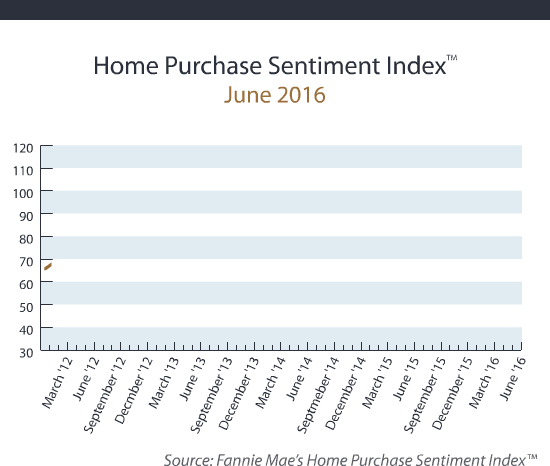July 07, 2016
Home Purchase Sentiment Index Decreases from High of 85.3 to 83.2
Fewer Consumers Expect Home Prices, Mortgage Rates to Keep Climbing; Stagnant Wages Weigh on Housing Outlook
-
Jennifer Lucas
-
202-752-6497
WASHINGTON, DC – Fannie Mae’s Home Purchase Sentiment Index™ (HPSI) decreased 2.1 points to 83.2 in June, down from May’s all-time survey high, as more consumers report mixed views toward housing and income growth. Among those surveyed, the share who said now is a good time to sell a home increased 5 percentage points on net to a survey-high of 18 percent, and those saying now is a good time to buy a home rose 3 percentage points on net to 32 percent. The share of consumers who expect home prices to go up over the next 12 months dropped 9 percentage points on net. In addition, those reporting that their household income is significantly higher than it was 12 months ago dropped 10 percentage points on net in June, and the net share of consumers who are not concerned about losing their job fell 4 percentage points. Fewer consumers also reported a positive outlook on the state of the economy – those who think the economy is on the wrong track ticked up to 59 percent in June.

“The HPSI’s pullback in June from last month’s survey-high reading suggests a slight weakening in the 12-month outlook for housing activity,” said Doug Duncan, senior vice president and chief economist at Fannie Mae. “Pending home sales have pulled back in the face of continued home price growth, and we’re seeing some softening in the higher priced components of the market. Growing pessimism about the overall direction of the economy gives us further pause as it now stands at the highest level we’ve seen in our National Housing Survey in the last two years. Meaningful improvement in the housing market going forward will likely require consistent upward movement in consumers’ income growth perceptions, which have thus far been stagnant. Also helpful would be an acceleration of supply accumulation of entry-level homes, which would moderate the growth of real home prices and increase affordability.”
HOME PURCHASE SENTIMENT INDEX – COMPONENT HIGHLIGHTS
Fannie Mae’s June 2016 Home Purchase Sentiment Index (HPSI) fell 2.1 percentage points in June to 83.2. Slightly more consumers on net expect mortgage interest rates to go down over the next 12 months. Overall, the HPSI is down 1.5 points since this time last year.
- After three straight months of declines, the net share of Americans who say that it is a good time to buy a house rose by 3 percentage points to 32%.
- Selling sentiment rose in June, with the net percentage of those who say it is a good time to sell rising 5 percentage points to 18% – a new survey high. A survey high and low were reached for those who think it is a good time and bad time to sell a home.
- The net share of Americans who say that home prices will go up fell 9 percentage points to 33%.
- The net share of those who say mortgage rates will go down over the next 12 months rose 2 percentage points to negative 41%, reaching an 18-month high.
- The net share of Americans who say they are not concerned with losing their job fell 4 percentage points to 68%.
- The net share of Americans who say their household income is significantly higher than it was 12 months ago fell 10 percentage points to 8%, the largest month-to-month decline in the survey’s history.
ABOUT FANNIE MAE’S HOME PURCHASE SENTIMENT INDEX
The Home Purchase Sentiment Index (HPSI) distills information about consumers’ home purchase sentiment from Fannie Mae’s National Housing Survey® (NHS) into a single number. The HPSI reflects consumers’ current views and forward-looking expectations of housing market conditions and complements existing data sources to inform housing-related analysis and decision making. The HPSI is constructed from answers to six NHS questions that solicit consumers’ evaluations of housing market conditions and address topics that are related to their home purchase decisions. The questions ask consumers whether they think that it is a good or bad time to buy or to sell a house, what direction they expect home prices and mortgage interest rates to move, how concerned they are about losing their jobs, and whether their incomes are higher than they were a year earlier.
ABOUT FANNIE MAE’S NATIONAL HOUSING SURVEY
The most detailed consumer attitudinal survey of its kind, Fannie Mae’s National Housing Survey (NHS) polled 1,000 Americans via live telephone interview to assess their attitudes toward owning and renting a home, home and rental price changes, homeownership distress, the economy, household finances, and overall consumer confidence. Homeowners and renters are asked more than 100 questions used to track attitudinal shifts, six of which are used to construct the HPSI (findings are compared with the same survey conducted monthly beginning June 2010). As cell phones have become common and many households no longer have landline phones, the NHS contacts 60 percent of respondents via their cell phones (as of October 2014). To reflect the growing share of households with a cell phone but no landline, the National Housing Survey has increased its cell phone dialing rate to 60 percent as of October 2014. For more information, please see the Technical Notes. Fannie Mae conducts this survey and shares monthly and quarterly results so that we may help industry partners and market participants target our collective efforts to stabilize the housing market in the near-term, and provide support in the future. The June 2016 National Housing Survey was conducted between June 1, 2016 and June 23, 2016. Most of the data collection occurred during the first two weeks of this period. Interviews were conducted by Penn Schoen Berland, in coordination with Fannie Mae.
DETAILED HPSI & NHS FINDINGS
For detailed findings from the June 2016 Home Purchase Sentiment Index and National Housing Survey, as well as a brief HPSI overview and detailed white paper, technical notes on the NHS methodology, and questions asked of respondents associated with each monthly indicator, please visit the Consumer Attitude Measures page on fanniemae.com. Also available on the site are in-depth topic analyses, which provide a detailed assessment of combined data results from three monthly studies of NHS results.
To receive e-mail updates with other housing market research from Fannie Mae’s Economic & Strategic Research Group, please click here.
JUL














